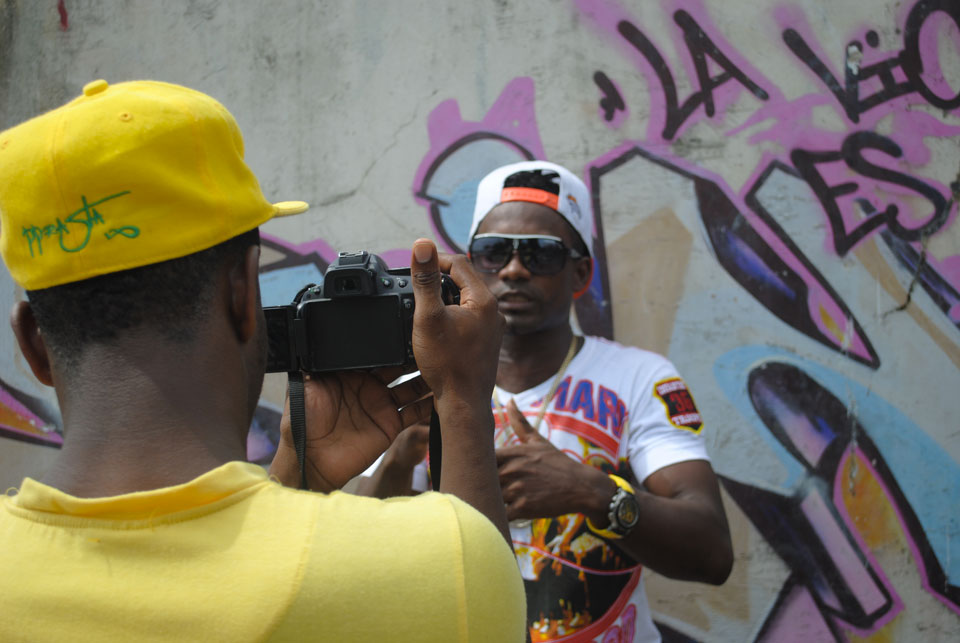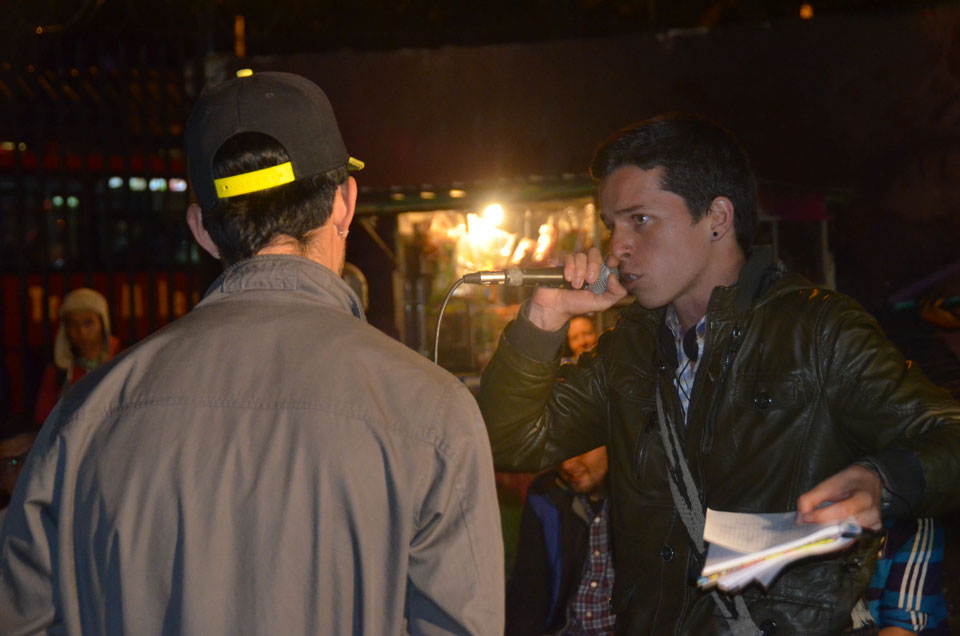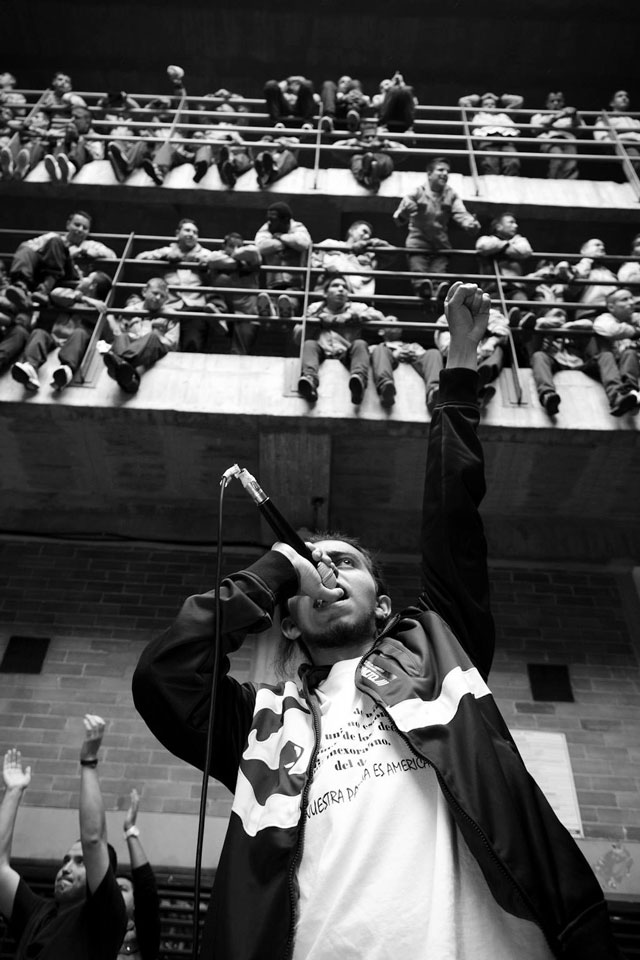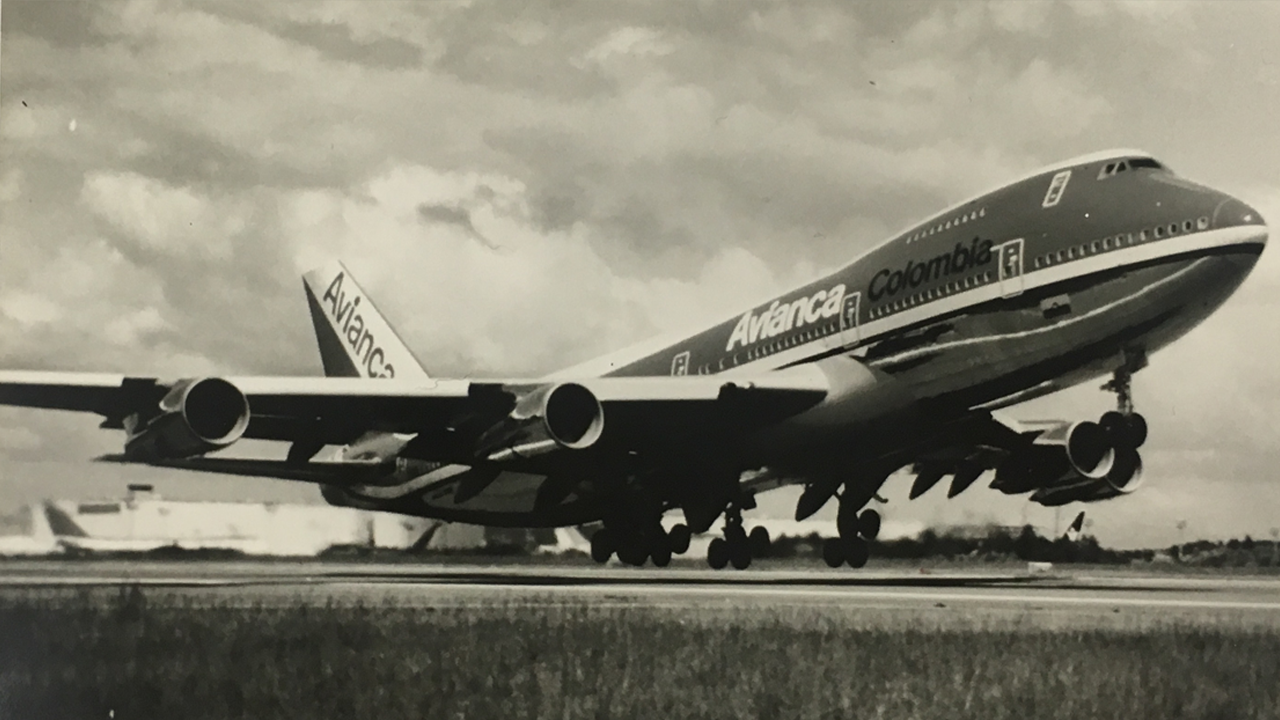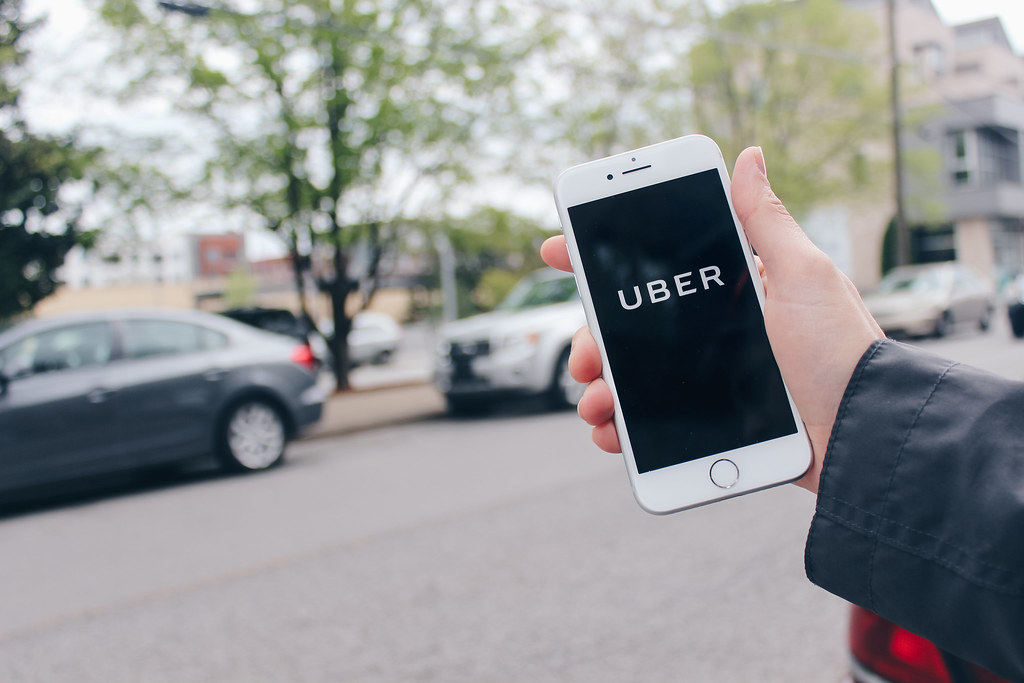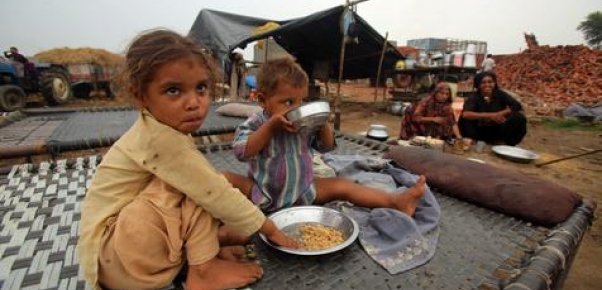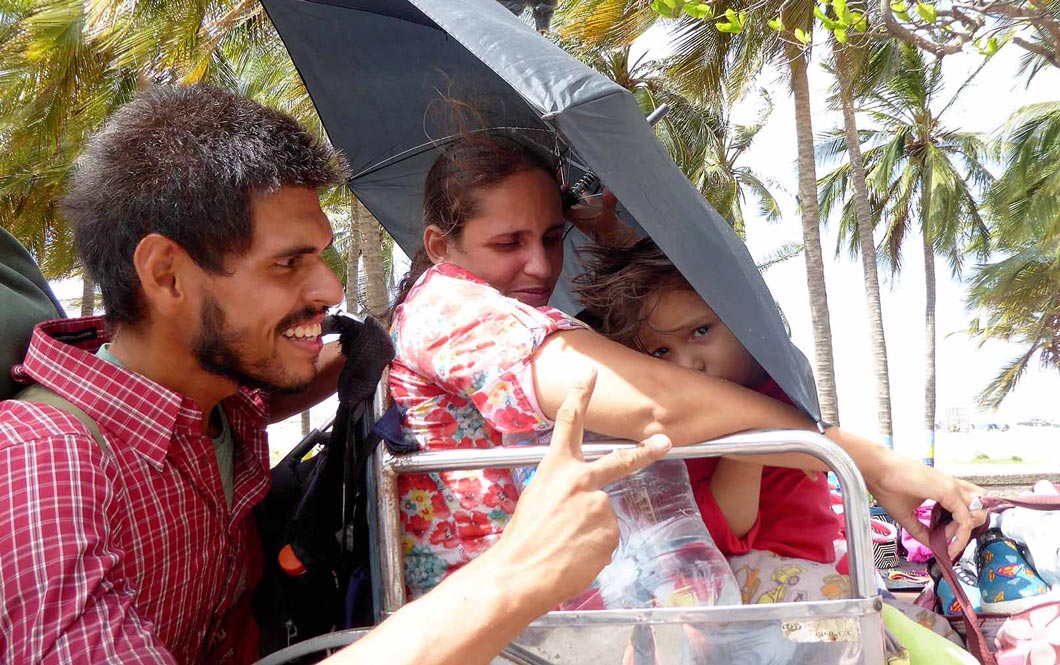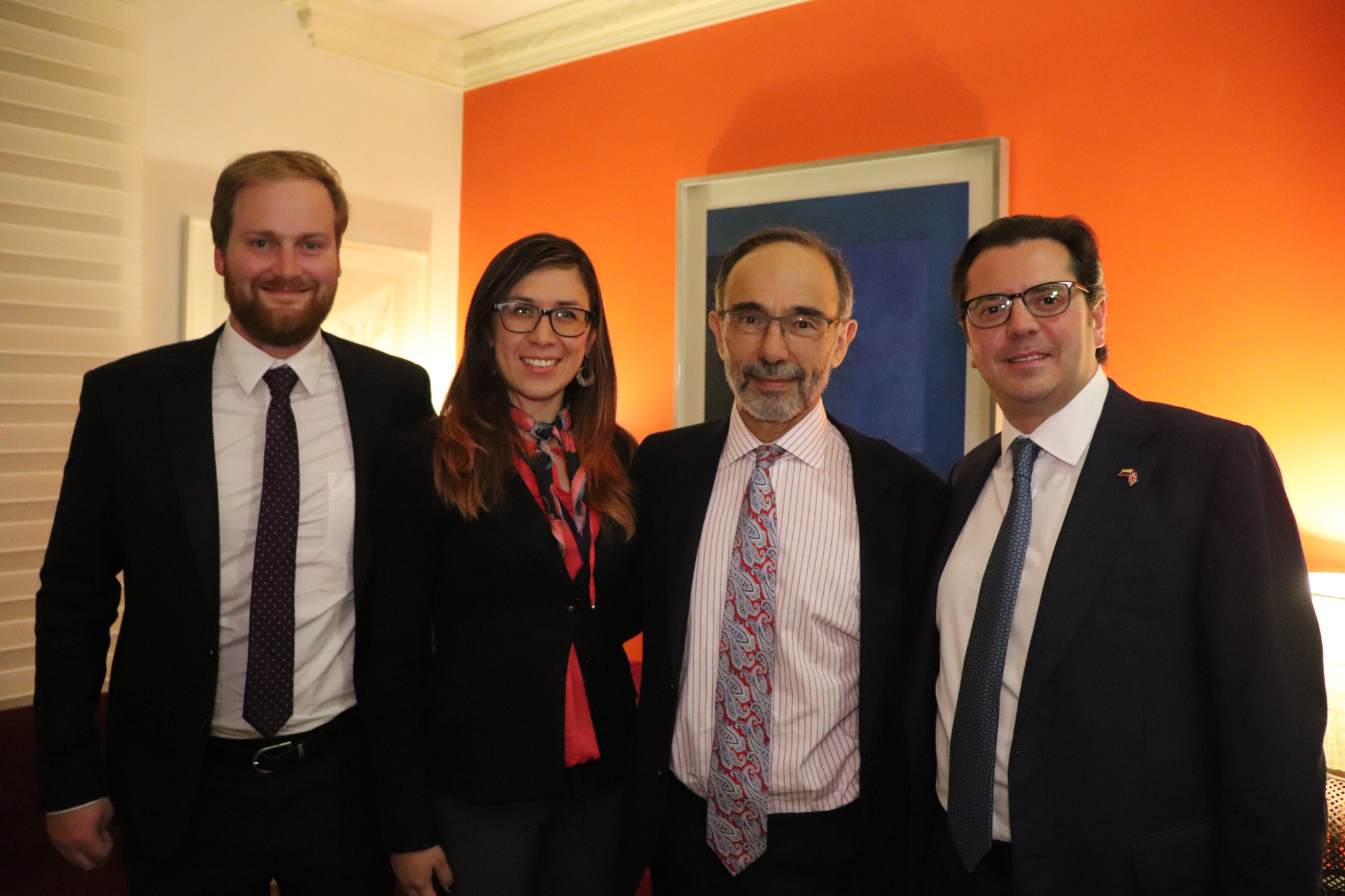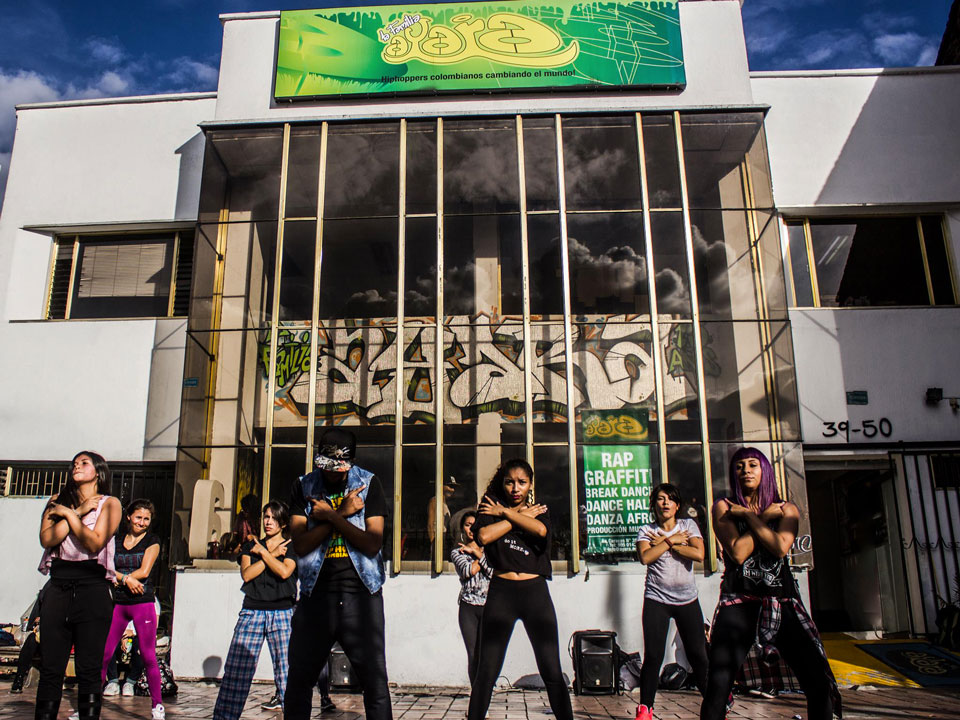
La Familia Ayara, one big hip hop family.
‘People living in violence and oppression aren’t used to expressing their opinions, but rap debate can let them, and it seems less offensive because it’s art’, says Don Popo, founder of La Familia Ayara. Phoebe Hopson finds out more about the innovative organisation that is empowering people through rap.
There is a cloud hanging over my interviews with La Familia Ayara because a valued member of the ‘family’ has passed away, murdered outside his home in Ciudad Bolívar. For the hip hop organisation that only one week before had been celebrating 20 years of inspiring work, the loss of Joel Asdrubal Smith Archbold, known artistically as Myfriend, is a huge shock.
La Familia Ayara – simply known as Ayara – uses the culture of hip hop to generate change and encourage participation in society. Rap debates are a key part of their work as they stimulate both involvement and critical thinking. Through their work providing workshops in local neighbourhoods and prisons, they extend a hand to some of the most forgotten members of Colombian society, welcoming them into a surrogate family.
What are rap debates?
Rap debates seek to mix the formal debating world with rap. In the style of a traditional rap battle, two competitors freestyle to lyrically outsmart their opponent, however instead of throwing insults, the MCs debate important issues facing Colombian society. La Familia Ayara take rap debates to prisons, remote areas of Colombia and to the local barrios of Bogotá to introduce people to hip hop and critical thinking.
Participants spend three months taking part in workshops on rap and debate techniques. In the final performance, the MCs are judged on their artistic ability and the strength of their arguments. If you want to check out this lively formula then head to Chorro de Quevedo on a Friday night where rappers often meet to test one another’s skills.
Myfriend came into contact with Ayara towards the end of his ten-year sentence in la Cárcel Distrital, a prison paradoxically considered ‘the best’ in Colombia. In 2013, he participated in Ayara’s rap debate program from prison, later going on to win the final event.
“His passion was rap and as soon as he was free he came and found us,” says Julián Alejandro Maldonado, Ayara’s program director. “Myfriend became part of Ayara, and in the two months he was with us, he recorded an album and set up a hair salon. Full of emotion, Julián pauses and continues, “he was always grinning and playing chess, he was the last person to cut my hair.” He tips his hat to show me, smiling fondly.
Whilst the circumstances surrounding Myfriend’s untimely death are tragic, they don’t overshadow the 28-year-old’s commitment to changing his life upon his release, nor the role that the NGO played in helping him realise his dreams.
Myfriend’s accomplishments are a testament to his passions and La Familia Ayara’s belief that hip hop, and especially rap debates, can offer solutions to those in difficult situations. “When people are in prison, excluded from society, they have lots of time for thoughts, feeling and reflections,” explains Jeyffer ‘Don Popo’ Rentería, Ayara’s founder. “Rap can help them find a balance and tranquillity within themselves.”
This sentiment is reflected among Ayara’s dedicated team members, many of whom started out as participants in the weekly workshops that take place in the brightly painted cultural centre on Avenida Caracas, before going on to become teachers themselves.
As Santiago Tinta, MC, rap debate teacher and university student points out, “Rap debate exposes people to debating skills without having to be part of the formal debating world.” He radiates an enthusiasm as he speaks which is both inspiring and infectious, much like the event itself.
Social pressures and context force people to make bad decisions, we’re providing tools to stop this, to stop violence
– Don Popo
Back in 2013, I spent six months working with La Familia Ayara. During this time I was fortunate to see Myfriend’s victory in La Distrital. It was a raucous and exciting finale. Hundreds of inmates clung to and leant over the railings surrounding the concrete courtyard, shouting and cheering down at the spectacle below – a joyous event despite the oppressive setting.
Nobody can deny the fun and energy that hip hop and rap debate bring. However, Don Popo is keen to remind me that debating in this country is no laughing matter. “Engaging in debating is dangerous in Colombia, expressing your opinion can put your life at risk,” he explains solemnly. “People living in violence and oppression aren’t used to [expressing their opinions], but a rap debate can let them do so, it seems less offensive because it’s art.” Along similar lines, rap debate judge Julián underlines, “During the event we constantly remind those participating and watching that it’s an exercise and that the opinions expressed are not personal.”
Although participants don’t necessarily express their own opinions (the rappers are given a side to take), community participation is integral to the process, as those of all ages are asked to contribute topics for debate. “It’s interesting,” adds Julián, “in different barrios, you see different realities. For example in Diana Turbay, an elderly lady requested we debate whether there should be police presence on the invisible borders that divide gang territories. We did exactly the same activity in Parkway and they wanted to debate dog poo fines.” We both chuckle in bemusement.
- Two boys filming a music video during a project in Quibó.
- MC Tinta taking part in rap debate.
- Cisco judging the 2013 rap debate in la Carcel Distrital.
Hip hop, born in the New York Bronx during the 1970s, is known worldwide as a form of rebellious expression that grew from frustrated and marginalised urban areas. Through clothing, hand gestures and artistic expression, hip hoppers can vocalise their reality and turn it into an identity. Fernanda ‘Feback’ Blanca, one of only a handful of female MCs in the organisation puts this idea into words very well. “Hip hop gives life meaning, making sense of the barrio in a way that only you can awaken with your experiences.” This is not only evidenced by the story Myfriend but also through the lives of everyone who forms a part of La Familia.
The vast crowd that Hip Hop al Parque attracts every year is representative of the genre’s popularity amongst young people. All the same, whilst hip hop preaches respect, it also receives criticism in the mainstream media for being a hostile environment for woman and the LGBT community. I broach the subject with Feback, her response is concise, and avoids the topic of discrimination. “Hip hop can help women to confront gender issues, helping them to empower themselves and making them subjects of their own rights.” Her well thought out answer doesn’t surprise me, as I’m sure this isn’t the first time someone has asked her the same question.
Hip hop gives life meaning, making sense of the barrio in a way that only you can awaken with your experiences
– MC Feback
“It’s something I’m very aware of,” explains Julián who is not afraid to call himself a feminist. “That’s why I always try to put a woman on the judging panel and explain at rap debate events that it’s a space for everyone, regardless of gender, race and sexual orientation.” There’s certainly a laudable sense of acceptance and tolerance within Ayara.
When I question Don Popo about the difficulties hip hop encounters, he is keen to point out that they aren’t exclusive to the genre, but reflective of society. “You don’t see many women in politics and sport in Colombia: as a country we are still under transformation.” His response isn’t defensive but rather mindful of the larger context that La Familia Ayara is working in. “Hip hop is stigmatised here, because it’s the music of poor young people who are also stigmatised for being violent and drug users,” he says with a hint of indignation. “I’ll always remember one of the first rap debates we did in 2012 in La Olla in the Bronx, I overheard a man encouraging his children to participate, because if he had this opportunity, he wouldn’t have to be selling drugs.” He continues optimistically, “it gives me hope, there is a nucleus of positivity within everyone. Social pressure and context forces people to make bad decisions. We’re providing tools to stop this, to stop violence.” And whatever stigmas there may be around hip hop, rap debate is certainly having an impact. It has received mainstream media coverage and they even organised one in congress. Don Popo laughs, “The politicians said we debated better than they did!”
Don Popo is an ambitious man and he has grand plans for the future of rap debate. “I want to see it in the national curriculum, the education system here isn’t innovating quickly enough, it’s not representing the interests of those in it.”
Hip hop plays an important dual role – opening up an art form and fighting an oppressive system – both of which are central to Ayara’s mission. It also gives opportunities, as Julián stresses, brimming with passion and resentment. “The death of Myfriend, showed us the potential of what we are doing, offering people a second chance at life that this country doesn’t offer.” His point summarises the bittersweet reality that Ayara faces: bringing music and art into the lives of those trapped in violence and poverty is a powerful thing, but it is not always enough to save people from hostile environments.
“I’m sure that Myfriend is happy,” ends Popo, a little more optimistically. “He made his dreams came true in the songs that he left us and the hair salon he created.” In memory of Myfriend, Ayara are now running hairdressing workshops in the salon he left behind.
Don Popo
From its humble beginnings as a clothing line for hip hoppers to a fully fledged cultural institution, La Familia Ayara has been running workshops and promoting hip hop culture in hard to reach parts of Colombian society for 20 years. I catch up with Don Popo, the moving force behind it all.
Jeffer Renteria, known artistically as Don Popo, is a fascinating man. The journey that led him to create La Familia Ayara is both a personal one and one that reflects a broader set of circumstances that affect the Colombian working class.
His roots are in the mining town of Condoto, El Chocó. In 1980, Don Popo’s grandmother moved the family to El Calvo Sur, Bogotá, in search of economic opportunities. A few years later his mother and uncle moved to the United States.
The popular rise of breakdancing in Colombia coincided with the fracturing of Don Popo’s family, and made way for his discovery of the art form.
“I was a young kid observing breakdance alive in Los Barrios,” he reminisces fondly over coffee, “my uncle sent me tapes of Public Enemy, 2 Life Crew and Fat Boy. I was captivated by the energy and the power.” Inspired by these early events Don Popo formed his first group when he was only 11 years old, fittingly called Los Children Rap.
At the age of 19, he was able to tour Europe with Gotas de Rap, one of the first commercially successful Colombian hip hop groups.
However, it wasn’t just admiration that pushed Don Popo to pursue his career, “I was an introverted child, my aunts even said I was autistic,” he chuckles pulling a nervous smile, a surprising anecdote from someone who emits a natural self-confidence.
Like many Colombians who grew up in the 80s, there is trauma, often unperceived in day-to-day life. “My father struggled with drug addiction and was killed in Cali during a social cleansing,” reveals Don Popo. “My first rap songs were about this, I had a lot to express that I hadn’t been able to do before.” His personal connection to hip hop is the driving force behind his success and conviction that it can bring real change to the lives of young people. His arguments are intelligent and convincing. “It’s a democratic art form, poor people can do it without studying music.”
In 2003, Don Popo moved to The Netherlands where he got involved with a Latin American think-tank. This was a pivotal point for La Familia Ayara as it opened up the opportunity for international collaboration and expansion. “With the resources from Europe we were able run more workshops in prisons, before we just did it with the profit from the clothes.” Although Don Popo, no longer lives in Holland, the Dutch NGO Young In Prison continues to be a key source of funding.
To date, rap debate is one of Ayara’s biggest achievements, an original initiative that combines freestyle with debating. “Over the last 20 years, I feel proud to have changed something about hip hop culture: freestyle normally consists of humiliating the other person, we’ve combined it with something positive.”
By Phoebe Hopson

